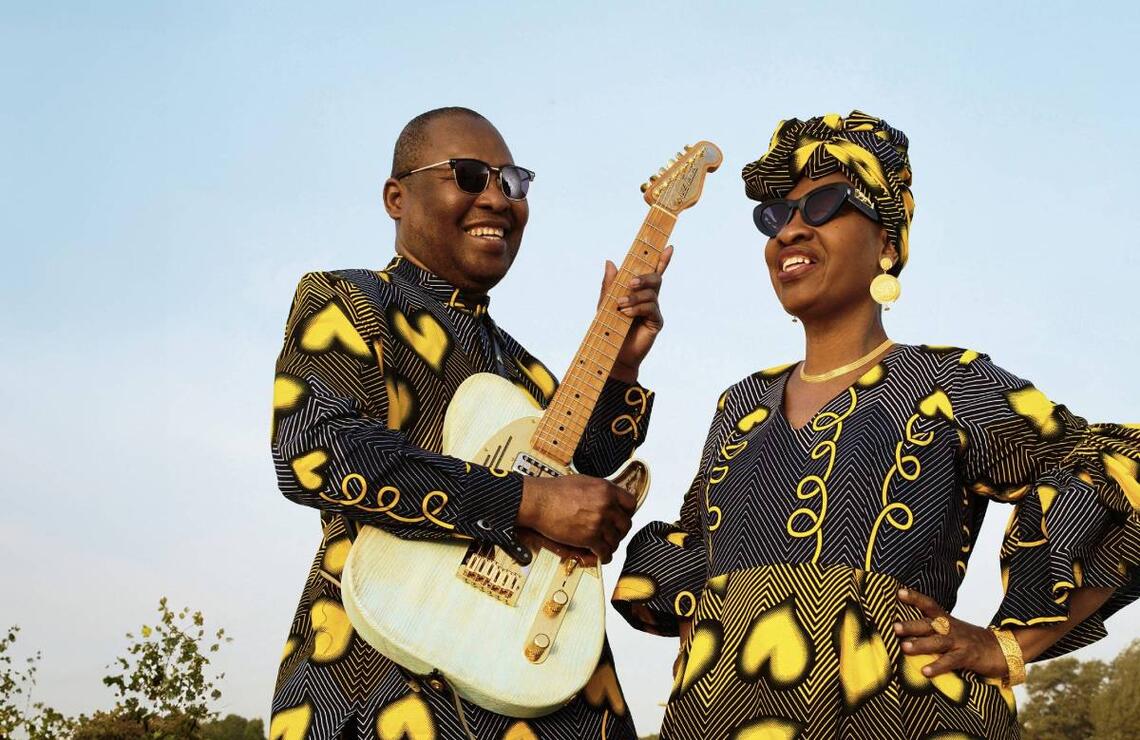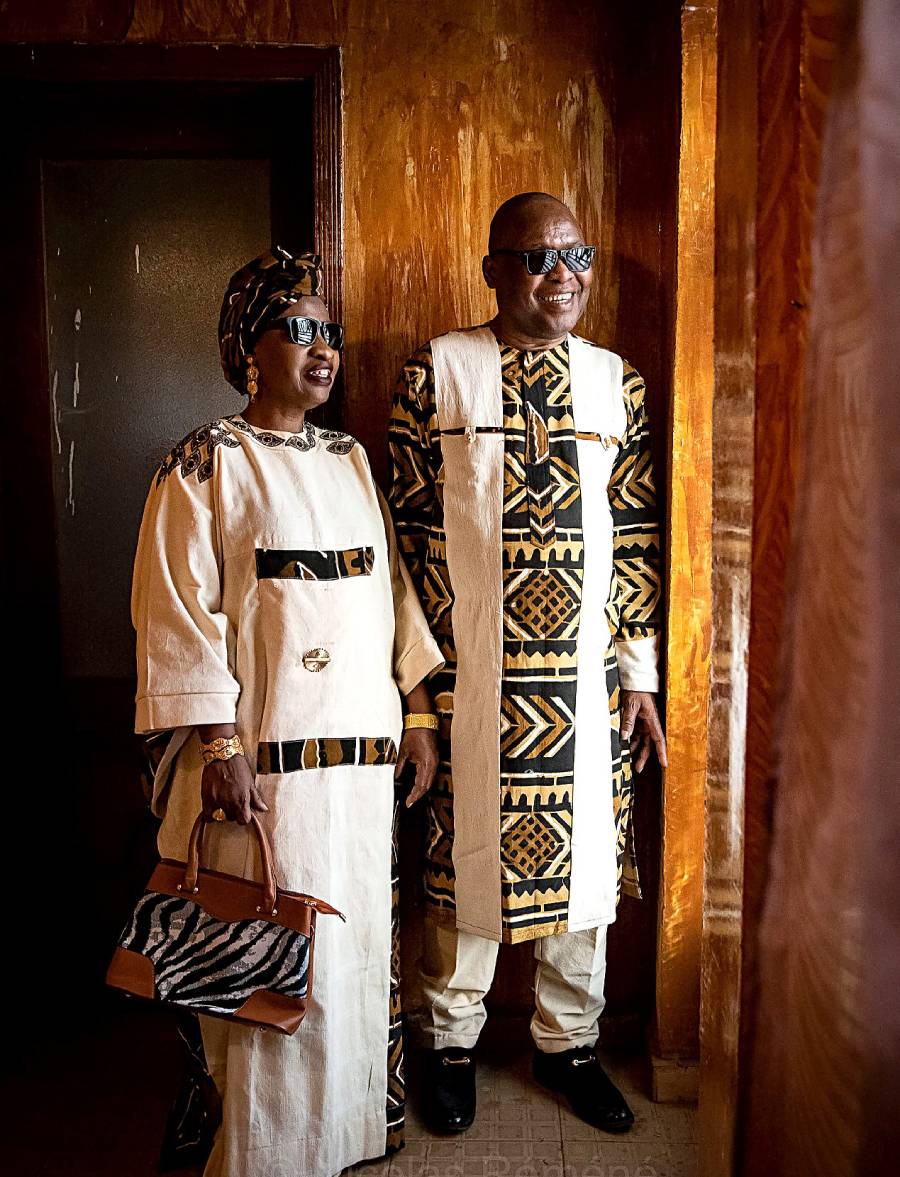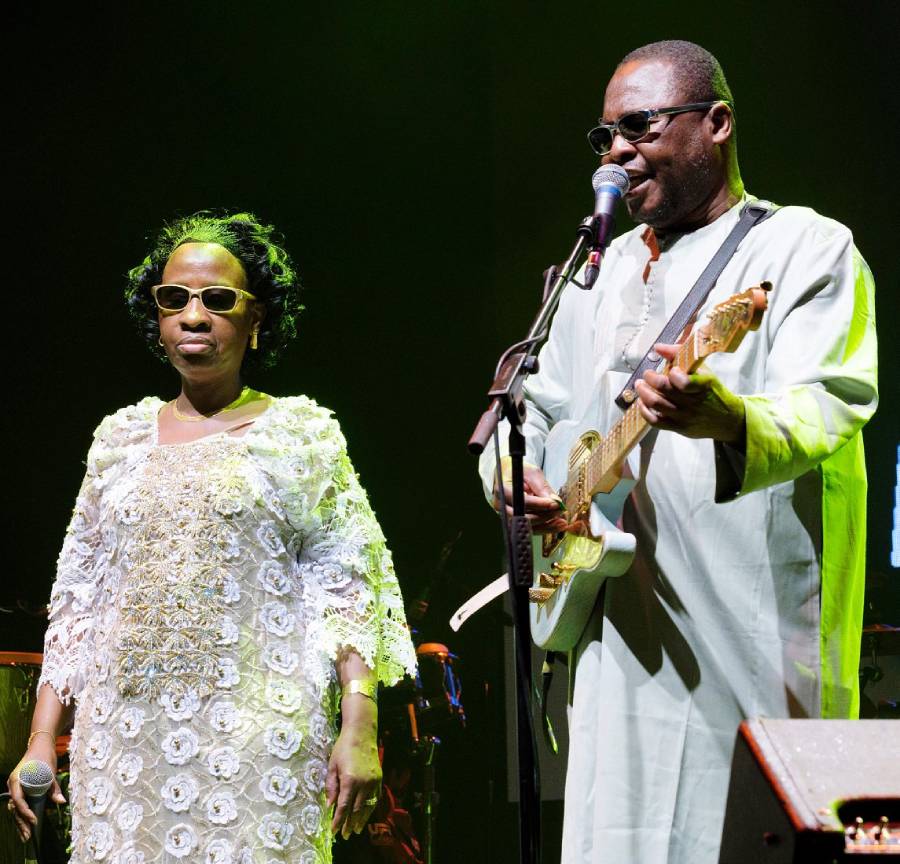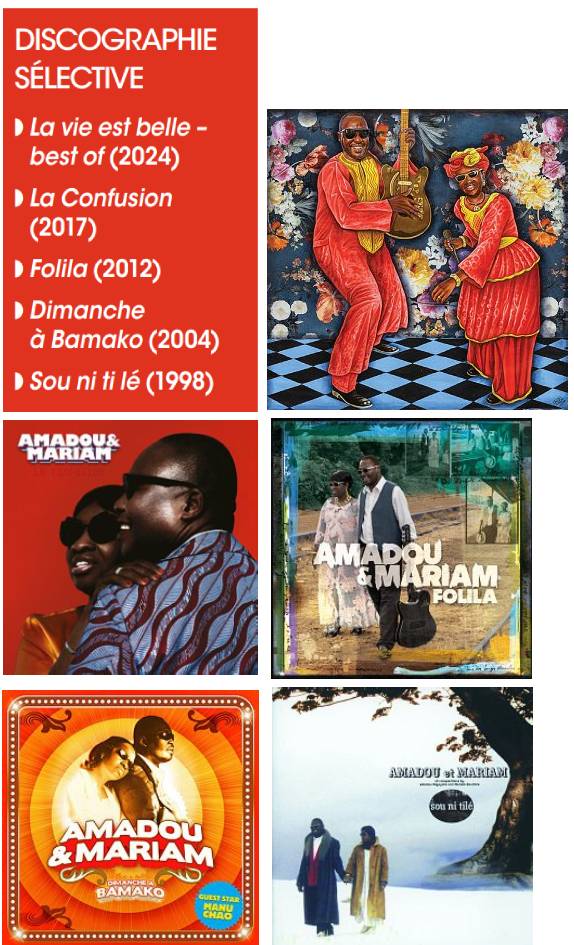
Amadou & Mariam
‘Taking life as it comes’
Since their love at first sight in 1975 at the Institute for the Young Blind in Bamako, they have never stopped singing and playing together. To coincide with the release of their truly historic compilation, meet a loving and iconic couple.

When you listen to ‘Mogulu’ (‘people’ in Bambara) with its timeless blend of the organic and the synthetic, there's no doubt you're listening to Amadou Bagayoko and Mariam Doumbia. It's an unreleased track but the sound is familiar, and it's a natural fit for La Vie est Belle, a compilation showcasing the last two decades of studio work by the world's best-known Malian couple. We meet in a Parisian café, over apple juice and sea bream. You can’t miss them – that sharp style, accentuated by Mariam's dazzling sunglasses and gold jewellery... It was love from the word go when they met at the Institut des Jeunes Aveugles (Institute for Young Blind People) in Bamako in 1975 and, since then, they have never stopped singing and playing together, adding marriage and children to their passion for music. A fairytale love story topped by international fame following the success of Dimanche à Bamako in 2004, an album on which they closely collaborated with Manu Chao, a former member of the group Mano Negra, who fell under the spell of Amadou & Mariam's hybrid artistic alliance. So it's hardly surprising to hear several tracks from the album, such as ‘Beaux Dimanches’ and ‘La Réalité’, on La Vie est Belle. The album also features tracks from their Éclipse project, which refers to the name of the group the couple played in at the Institut des Jeunes Aveugles, and also from a memorable performance at the Cité de la Musique in 2012, where the audience was plunged into darkness for the duration of the concert: “We wanted the audience to understand”, explains Amadou, “that not everything is based on the visual, that you can see in your head and feel the notes all the more. Sounds like rain, chickens clucking at dawn, children playing...”. Audible or not, these sounds of everyday life infiltrate the compilation, a compendium of twenty years of collaborations with international pop stars (Damon Albarn, TV on the Radio, Scissor Sisters and Santigold), yet which never made Amadou & Mariam forget their unwavering love for their native Mali.
La Vie est Belle is a lovely title for a greatest hits album... Is it also your mantra?
Amadou: Very much so, because the aim is to remind everyone that, despite the constant bad news, we mustn't lose sight of the beauty of life. We have to take it as it comes.
Mariam: And preserve it, whatever happens. Of course, there are times when we're not so sure of the value of life. Today's world is more anxiety-filled than it used to be. There's always been a shortage of joy, but more so these days... So we have to hold on to the little sources of happiness we can find here and there.
La Vie est Belle also evokes the lyrics of one of your most beautiful songs, ‘Sabali’, composed by Damon Albarn for the album Welcome to Mali, the first track on this album...
Mariam: ‘Sabali’ is a song about patience. That's probably the quality that has served me best throughout my life. I became blind at an early age, and I needed a lot of patience... Fortunately, I've been singing since I was six years old. At home, I used to listen to the radio with my father. Nana Mouskouri, Johnny Hallyday... I used to hum Sheila during my holidays. That's what got me dreaming, what made me want to go to France!
So much so that you and Amadou settled there many years ago, without ever losing sight of the universality of your music – which you have always envisaged as a blend of genres?

Amadou: Absolutely! When I played in the band Les Ambassadeurs du Motel de Bamako, in the 1970s, we went beyond French variety. I grew up with Cuban songs and Malian music, but we were also inspired by what was happening on the Anglo-Saxon side. Later on, our encounters with Manu Chao, Matthieu Chedid and Damon Albarn confirmed our belief in the need to constantly build bridges between musical artists.
Mariam: We both listen to blues, Cuban music, rap and psychedelic bands like Pink Floyd. We don't understand English, but it's what we love, what drives us both, what has brought us together, and it seemed obvious that we had to include these influences in our compositions.
Was this musical chemistry, which has been felt throughout your career, obvious from the start?
Mariam: Right from the first time Amadou and I performed together. It was on 20 January 1976. The audience was really enthusiastic, dancing, singing, crying and throwing coins! It really encouraged us.
Amadou: We played a lot in Mali, but we also performed in Burkina Faso and Côte d'Ivoire, where there were recording studios, something we didn't really have in Mali. We were complete strangers there, and at our first live show in Abidjan, there must have been two people in the room. But we didn't give up. One day, a producer heard us and helped us release cassettes of our songs. We stayed in Côte d'Ivoire for six years – six crucial years, because they gave us self-confidence.
What is your relationship with Mali today?

Mariam: We love Mali deeply, and we consider ourselves to be amongst its spokespeople. We're proud of that, especially as Mali is a land rich in music, whether in Fulani, Soninke or Bambara...
Amadou: We've always tried to convey Malian values beyond our borders. Our influence has enabled young artists, both rappers and folk guitarists, to get started. I remember the day after the Victoires de la Musique awards in 2005 [at which Amadou & Mariam won the award for Best World Album of the Year, Ed.], when we were congratulated for representing Africa. Before we came along, everyone knew Fela Kuti, of course. But it seems to us that our work has taken us beyond the simple label of world music... That's what this greatest hits album is humbly trying to show.
As Amadou & Mariam, how do you maintain both your relationship and your musical duo?
Mariam: We listen to each other! We've been married since 8 July 1980. We danced for hours, the guests were all dressed up, we were all very happy. We cherish that memory. You can't go forty-five years without fighting, but we had to overcome the problems, manage our family, keep working and look after our children. That's the most precious thing.
Amadou: I think of Mariam's voice, which is what made me fall in love with her. Music is the basis of our relationship, and we love working on it together in the studio, before bringing it to life on stage. We're as faithful to each other as we are to the messages we want to get across, ever since we started out.
Messages of peace and sharing... And sometimes a few pointed remarks about current politics, particularly on the track ‘C'est pas Bon’?
Mariam: You can only achieve universality through sincerity. We sing of peace, love, sunshine... Without forgetting those who listen to us, too, with albums like La Confusion, which we released in 2017, a particularly difficult year in Mali.
Amadou: ‘C'est pas Bon’ reminds us that society doesn't always function as it should: it forgets respect for others, basic justice. In the end, we share the same message as the rappers... we just don’t express it the same way.